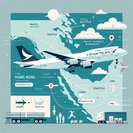
Effective 15 November, Nepali passport holders who remain airside at Hong Kong International Airport no longer need a transit visa, ending a 20-year requirement first imposed in 2005. The Immigration Department confirmed the change in a 14 November gazette notice, framing it as part of Hong Kong’s efforts to enhance Belt-and-Road connectivity and strengthen its status as an international aviation hub.
The move followed sustained lobbying by Kathmandu and the Consulate-General of Nepal in Hong Kong, which argued that the HK$250 transit-visa fee and multi-day processing were deterring migrant workers, students and business travellers who rely on Hong Kong’s extensive flight network. Nepali authorities hailed the decision as a “notable achievement” that will simplify itineraries for the roughly 60,000 Nepalis transiting the SAR each year en route to the Gulf, Europe and North America.
![Hong Kong abolishes airport transit-visa requirement for Nepali nationals]()
Airlines stand to benefit immediately: carriers such as Cathay Pacific, Nepal Airlines and Qatar Airways can now market shorter, single-ticket routings through Hong Kong without warning customers about extra paperwork. Travel-management companies estimate average booking times for corporate passengers will fall by two to three days.
For global-mobility teams, the practical implication is that Nepali assignees can now choose Hong Kong as a preferred connection point, which could lower airfare costs. Employers should, however, remind travellers that the visa-free concession applies strictly to passengers who stay within the restricted area; leaving the airport still requires a standard visit visa or the Quality Migrant Admission Scheme for longer-term entry.
Observers note that Hong Kong is likely to study further targeted relaxations for other Belt-and-Road states after monitoring security data from the Nepali trial. If successful, similar transit-visa waivers could follow for countries such as Bangladesh or Sri Lanka, enhancing the city’s competitiveness versus Singapore and Doha.
The move followed sustained lobbying by Kathmandu and the Consulate-General of Nepal in Hong Kong, which argued that the HK$250 transit-visa fee and multi-day processing were deterring migrant workers, students and business travellers who rely on Hong Kong’s extensive flight network. Nepali authorities hailed the decision as a “notable achievement” that will simplify itineraries for the roughly 60,000 Nepalis transiting the SAR each year en route to the Gulf, Europe and North America.

Airlines stand to benefit immediately: carriers such as Cathay Pacific, Nepal Airlines and Qatar Airways can now market shorter, single-ticket routings through Hong Kong without warning customers about extra paperwork. Travel-management companies estimate average booking times for corporate passengers will fall by two to three days.
For global-mobility teams, the practical implication is that Nepali assignees can now choose Hong Kong as a preferred connection point, which could lower airfare costs. Employers should, however, remind travellers that the visa-free concession applies strictly to passengers who stay within the restricted area; leaving the airport still requires a standard visit visa or the Quality Migrant Admission Scheme for longer-term entry.
Observers note that Hong Kong is likely to study further targeted relaxations for other Belt-and-Road states after monitoring security data from the Nepali trial. If successful, similar transit-visa waivers could follow for countries such as Bangladesh or Sri Lanka, enhancing the city’s competitiveness versus Singapore and Doha.








